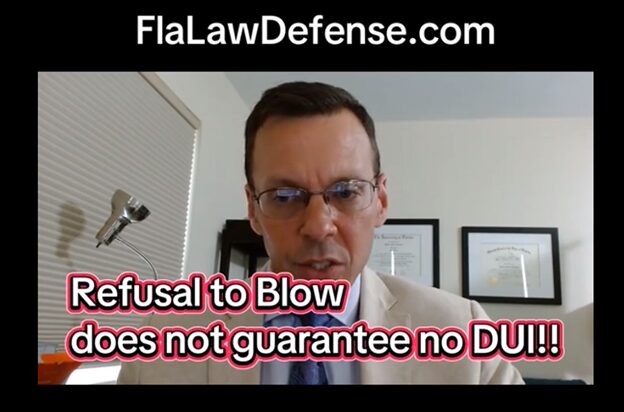Call us now:
What you need to know about Florida Law, don’t be fooled by these common myths.
Common misconceptions about Florida law are often spread, leading to confusion and anxiety. This video will dispel these myths and provide clear, accurate information about Florida law, empowering viewers with knowledge and peace of mind.
Florida’s legal system is full of complexity—and unfortunately, full of myths. These misconceptions often lead to fear, poor decisions, and unnecessary legal trouble. In this video, we’ll correct some of the most common misunderstandings about Florida criminal law and explain the actual legal protections you have under the law.
These are some of the most common misconceptions/myths:
-Arrest always leads to a conviction
-DUI refusal to blow means you cant be convicted of DUI
-Stand your ground means you can always use deadly force
– must speak to police or answer their questions

Learn all about Florida criminal law and specifically Florida criminal defense from Matt Landsman at Landsman Law, a Board Certified criminal defense lawyer with more than 20 years of experience and over a hundred trials of every kind.
Making a mistake having to do with misunderstanding the law can lead to disastrous consequences. Whether you are pulled over and are worried about what can happen when asked to use a breathalyzer, to whether or not you can defend yourself in a dangerous situation, not knowing the law can get put you in a situation where every choice you make could cost you prison time, lose your drivers license, or accidentally incriminate yourself or weaken a case that someone is building against you. Find out first, before things get bad in the world of criminal law defense.
4 MYTHS IN ABOUT FLORIDA CRIMINAL LAW
Myth #1: An Arrest Means You’re Guilty
Let’s start with a big one: Just because you’ve been arrested does not mean you’ll be convicted. That’s a myth. Under the U.S. Constitution, Fifth and Sixth Amendments, and the Florida Constitution, Article I, Section 9, you have the right to due process. A conviction only occurs after a plea—voluntarily entered—or after a trial where the State must prove guilt beyond a reasonable doubt. Being arrested is merely the beginning of a criminal process—not the end. You still have rights, and we’re here to defend them every step of the way.”
Myth #2: Refusing a Breath Test Means You Can’t Be Convicted of DUI
Many people think refusing a breath test means you can’t be found guilty of DUI. That’s simply false. Under Florida Statutes § 316.193, a person can be convicted of DUI if they are in actual physical control of a vehicle and are either: Under the influence of alcoholic beverages or controlled substances to the extent that normal faculties are impaired, OR have a blood or breath alcohol level of 0.08 or higher.

So, even if you refuse a breath test—which, by the way, can result in a license suspension under § 316.1932—the State can still use officer observations, field sobriety tests, bodycam footage, or other evidence to show impairment. Refusing to blow doesn’t end the case—it can complicate it.
Myth #3: Stand Your Ground Means You Can Always Use Deadly Force
‘Stand Your Ground’ is one of Florida’s most misunderstood laws (776.032). People assume it gives a blanket license to use deadly force in any confrontation. Not true. Under Florida Statutes § 776.012 and § 776.013, you can only use deadly force if you reasonably believe such force is necessary to prevent imminent death or great bodily harm to yourself or another, or to prevent a forcible felony. Even then, the use of force must be proportional to the threat.
While you don’t have a duty to retreat under these statutes, the law still requires that your belief in the threat be objectively reasonable. Misusing this law could lead to criminal prosecution. That’s why you need experienced legal guidance before making assumptions.”
Myth #4: You Have to Talk to Police
This is critical: You are never required to answer police questions without a lawyer present (barring some extremely rare circumstances). Under the Fifth Amendment to the U.S. Constitution, and Article I, Section 9 of the Florida Constitution, you have the right to remain silent. You also have the right to an attorney under the Sixth Amendment and Florida Constitution, Article I, Section 16.
If law enforcement tries to question you, you can—and should—say: ‘I am invoking my right to remain silent, and I want to speak to a lawyer.’ Remember: Anything you say can and will be used against you in court. Don’t give the State evidence to use against you—assert your rights immediately. Misinformation leads to mistakes. And mistakes can cost you your freedom, your record, and your future. Whether you’re facing charges or just trying to understand your rights, we’re here to give you accurate answers—not myths.
For more information about Florida Criminal Law click here.
For help with any Criminal Matter – CALL NOW
